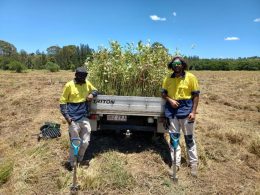Global genetic improvement consultancy AbacusBio has introduced the world’s first sustainability index for plants, aimed at reducing the environmental impact of crop cultivation.
This index allows breeding companies to develop commercially viable plant varieties that use less water, produce fewer harmful emissions, and still optimise crop yield, plant health, and disease resistance. The index is supported by a rigorous methodology created by AbacusBio, based in New Zealand, for precisely assessing the sustainability performance of various plant types, including pasture, row, horticulture, and tree crops.
The new index has already demonstrated its capability to create plant varieties that merge high sustainability with excellent health and yield. Initiated at the beginning of the year, the project is led by AbacusBio geneticist Dr. Kathryn Grant, who is based in Edinburgh.
Dr. Grant explained that the methodology evaluates how breeding for different genetic traits can mitigate greenhouse gas emissions, nutrient runoff, and acidification, while also reducing water and land usage.
She said, “There are two things to consider when trying to increase the sustainability of crops; improving management practices and improving genetics. As AbacusBio is a genetics company, so genetics is our focus: we help plant breeding companies to find the ‘Rockstar’ varieties, amongst the thousands of potential plants.”
Dr. Grant explained that the Rockstar varieties may have rare but naturally occurring combinations of genes that enable lower inputs, produce less emissions, or have lower water requirements, yet retain the same yield and quality as other varieties grown under the same conditions.
“The selection index works by quantifying, in economic and environmental terms, the overall value of each variety and allows our customers to breed for profit, yield, disease resistance, and other key commercial qualities that their customers demand, alongside sustainability,” she said.
Dr. Grant also highlighted the potential benefits for farmers facing rising costs of fertilisers and crop inputs. She said that selecting plants that utilise nitrogen more efficiently means farmers need to use less fertiliser to achieve the same yield, benefiting both the environment and their bottom line. Similarly, selecting genes for heat or cold tolerance in horticulture can reduce energy costs for greenhouse heating and cooling.
The adoption of more sustainable crops could also impact future agricultural support systems. As governments consider reforms to encourage sustainable farming practices, new, sustainable plant varieties could play a significant role in meeting these goals.
“Generating the same amount of yield from less land will mean more land can be put over to environmental schemes such as growing trees or restoring habitats. This will make it easier for farmers to access the subsidies they need to make their farm businesses sustainable over the long term,” Dr. Grant added.
















